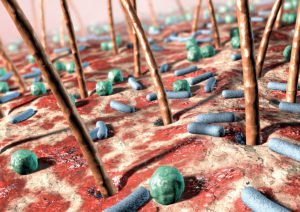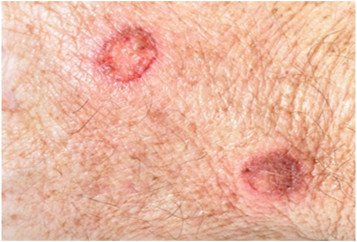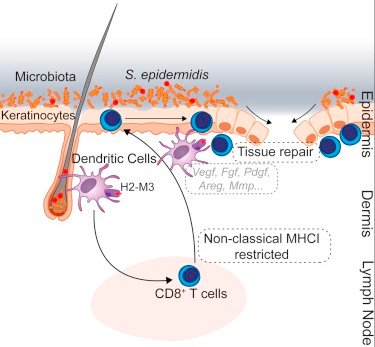Bacteria On Skin Can Aid Wound Healing
When we hear and think of bacteria, our subconscious quickly registers the term as a threat to health and the body. But according to research I came across recently, ‘bacteria’ doesn’t quite get the recognition it sometimes deserves.

Recognition for bacteria. Weird, right?
Well, a research on the correlation between the microbes on mice skin surface and wound healing actually reveals an interesting discovery. As much as we hate bacteria and attribute it to be highly responsible for so many illnesses, some of them have been discovered to be beneficial in terms of aiding the fast healing of wounds.
Earlier Research on Skin and Bacteria communication
Back in 2014, a research conducted at the University of Manchester was published online. It was based on the analysis of how some types of bacteria can aid the treatment and healing of chronic wounds, which are injuries that often require greater attention and take a longer time to heal.

The 2014 Analysis
As part of the study, Doctors took cognizance of skin bacteria from tissue samples of people who suffered chronic wounds that either healed or did not heal. This was in order to ascertain if certain bacteria types or communities were responsible for some wounds failing to heal properly.
The researchers observed something when they used laboratory mice for the study. The set of mice that were lacking a specific kind of gene were noticed to have a different arrangement of skin microbiota, which meant that they had an abundance of harmful skin bacteria that caused wounds to heal at a much slower pace than wounds of mice that had the copy of the particular gene under consideration.
The gene in question could be essential in aiding cells recognize the particular types of bacteria that they should fight, and the types they should allow to aid the wound healing stages. The gene is also linked to Crohn’s disease, which is the bowel disease that occurs when the linings of the intestinal walls experience inflammations.
The head researcher at the University of Manchester and lead author of the study, Dr. Matthew Hardman, concluded that his team was able to provide valuable evidence that can aid further studies of how cell and bacteria communication can be instrumental in effective wound treatment.
Dr. Matthew Hardman in a statement said;
“This study gives us a much better understanding of the types of bacterial species that are found in skin wounds, how our cells might respond to the bacteria and how that interaction can affect healing.”
The 2018 Bacteria Study and Analysis
A new research published this January, 2018, further clarified earlier studies as to the discovery that microbes present on the surface of the skin can aid the immune system to respond to injury and heal wounds faster.
The research on body immunity has, overtime, focused on the body’s response to inflammations and pathogens. This has made the knowledge of how our own microbiota interacts and regulates the body’s immune system, relatively unknown.
However, as a new research on the subject begged for more recent and detailed focus, a team of NIAID scientists led by the chief of the Mucosal Immunology Section of NIAID's Laboratory of Parasitic Diseases, Yasmine Belkaid, Ph.D., decided to investigate further.
Yasmine Belkaid and her colleagues at the National Institute of Allergy and Infectious Diseases, part of the National Institutes of Health in Bethesda, Maryland, decided to figure out how the immune system detects and responds to microbes present and inhabiting the skin surface.
By using lab mice as well in the study, the NIAID scientists found that after injury, the immune system calls on different molecules to detect skin microbes more than it uses to sense pathogens. Also, it was discovered that the immune system’s response to certain bacterial microbes encourages the repair of injured or worn tissue.
The Latest Discovery
Detailed investigation revealed the reaction of the immune cells of the mice to Staphylococcus epidermidis - a bacterium that doesn’t normally cause disease commonly found on human skin.

Surprisingly, the mouse immune cells recognized the Staphylococcus epidermidis when evolutionarily non-classical MHC ancient molecules were used. This immune system alliance led to the production of unusual T cells possessing genes linked with antimicrobial defense and tissue healing.
Normally, the immune cells use classical MHC molecules to recognize disease-causing bacteria, which then lead to the production of T-cells capable of stoking inflammation.
The scientists grouped the mice test subjects into two – one group had been colonized by Staphylococcus epidermidis and the other group had not. They then took biopsy samples from the skin of the two groups of mice.
During a five day period, mice that were exposed to the Staphylococcus epidermidis bacteria experienced more tissue repair at the site of their wounds with less inflammation.
The discovery has necessitated Dr. Belkaid and her team to initiate plans on probing whether non-classical MHC molecules can recognize benevolent microbes on the skin of other mammals, including humans, as well as trigger similar tissue repair.
Conclusion
As brilliant as this discovery is, further research will certainly go a long way to explore if the findings can significantly apply to humans. Also, a deeper understanding of some microbes’ role in immunity could fast track novel approaches to tackling tissue repair which remains a basic challenge in the field of medicine.
Another point to note as well is that, although further research is needed to ascertain which specific cells and types of bacteria are compatible with one another, the strong point of the study still remains that the knowledge gained would help unlock future methods of research and lead to new approaches toward wound healing treatments.
Also if the processes initiated by the microbes can be mimicked, clinicians may be able to use the procedure to not only accelerate wound healing, but also be able to prevent dangerous infections.
Study (2018): Paper
Reference:
Further Reading:
Thank you for your time and for reading my post.
If you found this post interesting, then kindly UPVOTE, RESTEEM and FOLLOW @rickie, for more quality posts.
You Can Check Out My Other Posts Below:
- An Artificial Intelligence Algorithm Can Help Prevent Suicide
- You Are More Creative If You Smoke Marijuana, According To Studies
- Accidental Inventions That Impacted Our World
- High-Salt Intake Over Long Periods Can Affect The Brain
- Diabetes and Obesity Can be Prevented By Blocking FKBP51 Protein
- Nissan develops 'B2V' System That Lets You Drive A Car With Your Brain

Great post! I actually conducted research regarding staphylococcus epidermidis and it's effects when mutated. It's an extremely interesting bacteria! It's so common in the human flora but actually possess huge issues in clinical settings if appliances are not completely sterile since the bacteria can then become pathogenic. Looking forward to more posts from you! I really enjoyed reading this
You're so nice for commenting on this post. For that, I gave you a vote! I just ask for a Follow in return!
Thank you! Will do
Thanks for reading @alexipapa. I was truly fascinated by the idea that bacteria on our skin could potentially aid the healing of wounds, so i decided to read up on it, and truly the staph bacteria is extremely unique in nature.
My major qualms with the idea of skin bacteria and its potential is, how do we handle bathing and scrubbing the skin now, especially during hot baths? Lolz...
Are we no longer going to scrub, just so we can preserve skin bacteria? Its a crazy line of thought though.
Right! I totally agree with you. I think, obviously this is completely subjective, that we should try to deviate from the germophobic culture that has encapsulated this age. Hand sanitizer every 5 seconds for no reason. Obviously it's extremely important to wash your hands and hygiene cannot be stressed enough, however, there is something to be said about preparing your body for encounters with bacteria in order to strengthen your immune system. This also plays a role in adaptive immunity. Basically, don't be over the top with scrubbing every inch of your body multiple times a day because you do dry out your skin and you destroy potentially beneficial bacteria. Food for thought!
Interesting.
Thanks
I did not know about them, it was a nice post, congratulations.
Thanks for reading @mrskatie
Definitely scientists marvel at their hard work to explain all the mysteries of science ...
Unquestionably in the wonderful world of our Creator "EVERYTHING" may be possible.
I have always maintained the position that people understand "bacteria" as a threat and recognize them for the damage they cause, but not far from this they do not know the benefits they can offer to health, or the multiple utilities that they have in the food industries for example, are made with the help of microorganisms (wines, cheeses, yogurt and many other foods), also thanks to a microorganism called Penicillum the antibiotic Penicillin was created, used to fight bacterial growth by its broad spectrum in the inhibition of many bacteria.
Congratulations! This post has been upvoted from the communal account, @minnowsupport, by Rickie from the Minnow Support Project. It's a witness project run by aggroed, ausbitbank, teamsteem, theprophet0, someguy123, neoxian, followbtcnews, and netuoso. The goal is to help Steemit grow by supporting Minnows. Please find us at the Peace, Abundance, and Liberty Network (PALnet) Discord Channel. It's a completely public and open space to all members of the Steemit community who voluntarily choose to be there.
If you would like to delegate to the Minnow Support Project you can do so by clicking on the following links: 50SP, 100SP, 250SP, 500SP, 1000SP, 5000SP.
Be sure to leave at least 50SP undelegated on your account.
Great post, thanks mate :)
You got a 4.09% upvote from @postpromoter courtesy of @rickie! Want to promote your posts too? Check out the Steem Bot Tracker website for more info. If you would like to support development of @postpromoter and the bot tracker please vote for @yabapmatt for witness!
Good post
Now he issue of over sanitation on healthcare settings comes up.
A sterile environment is an excellent place for pathogenic flora to grow.
Washing your hands with non anti-bacterial soap is great! Hand sanitizer on the other hand....Questionable.
Why? simply because of convenience? may not be worth it.
These bacteria’s can also be caused due to diet such as meat and dairy.